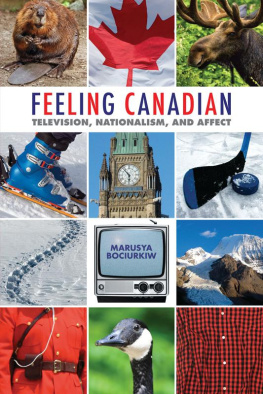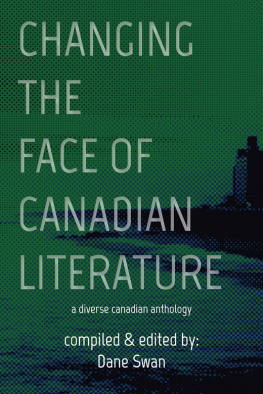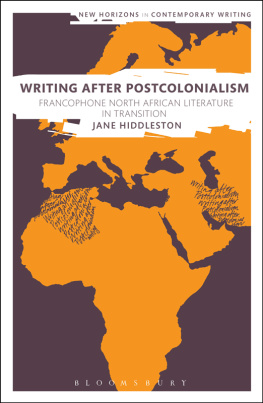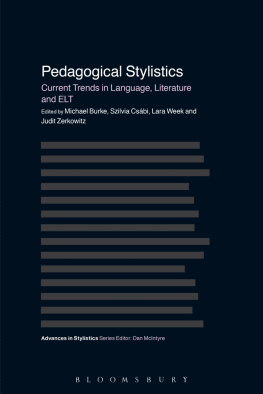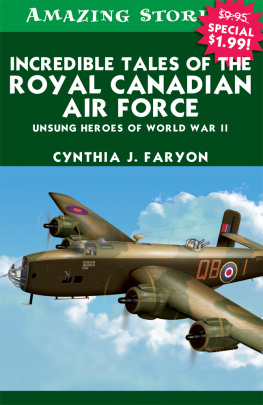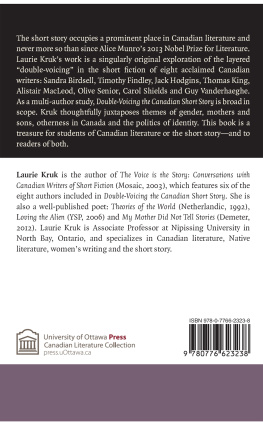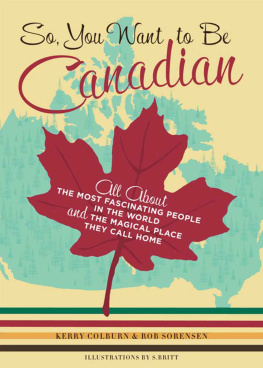Home-Work:
Postcolonialism,
Pedagogy, and
Canadian Literature
Home-Work:
Postcolonialism, Pedagogy, and Canadian Literature
28 REAPPRAISALS: CANADIAN WRITERS
Edited by
Cynthia Sugars

REAPPRAISALS:
Canadian Writers
Gerald Lynch
General Editor
National Library of Canada Cataloguing in Publication
Home-work: postcolonialism, pedagogy and Canadian
literature / edited by Cynthia Sugars.
(Reappraisals, Canadian writers; 28)
Includes bibliographical references.
ISBN 0776605771
1. Canadian literature - Study and teaching - Canada. 2. Canadian
literatureHistory and criticismTheory, etc. 3. Postcolonialism.
I. Sugars, Cynthia Conchita, 1963- II. Series.
PS8021.H64 2004 C810.7071 C2004901259-2
University of Ottawa Press gratefully acknowledges the support extended to its publishing program by the Canada Council and the University of Ottawa. We also acknowledge the support of the Faculty of Arts of the University of Ottawa for the publication of this book.
We acknowledge the financial support of the Government of Canada through the Book Publishing Industry Development Program (BPIDP) for our publishing activities.

All rights reserved. No parts of this publication may be reproduced or transmitted in any form or by any means, electronic or mechanical, including photocopy, recording, or any information storage and retrieval system, without permission in writing from the publisher.
Cover illustration: Charles Pachter, Mooseplunge
Cover design: Laura Brady
ISBN 0776605771 ISSN 11896787
University of Ottawa Press, 2004
542 King Edward Street, Ottawa, Ont. Canada KIN 6N5
press@uottawa.ca http://www.uopress.uottawa.ca
Printed and bound in Canada
Contents
CYNTHIA SUGARS
National Pedagogy and Globalization
SMARO KAMBOURELI
DIANA BRYDON
DONNA PALMATEER PENNEE
ROY MIKI
PAUL HJARTARSON
LESLIE MONKMAN
Postcolonial Pedagogies
BRENDA CARR VELLINO
GERRY TURCOTTE
BEVERLEY HAUN
Decolonizing the Classroom
ARUN P. MUKHERJEE
TERRY GOLDIE with ZUBIN MEER
GARY BOIRE
ROBERT BUDDE
Teaching/Reading Native Writing
HEIKE HARTING
SUSAN GINGELL
LAURIE KRUK
DANIELLE SCHAUB
MISAO DEAN
MARGARET STEFFLER
LISA GREKUL
MARIAM PIRBHAI
HEATHER MURRAY
CAROLE GERSON
RENE HULAN
JENNIFER HENDERSON
KATHLEEN MARIE CONNOR
LINDA RADFORD
STEPHEN SLEMON
Acknowledgements
I am grateful to the Social Sciences and Humanities Research Council of Canada for a grant that helped gather these scholars together. I am also indebted to the Faculty of Arts of the University of Ottawa for its financial support of this project, from its contribution to the 2002 conference, to their publication subvention, to its ongoing support of the Reappraisals series as a whole. My thanks to my Canadianist colleagues in the Departments of English at the University of Ottawa (especially Gerald Lynch) and Carleton University for their encouragement, advice, and participation at various stages in this project. I am also grateful to the two anonymous readers who responded so enthusiastically to this collection and offered insightful suggestions for its improvement. I would very much like to thank Charles Pachter for generously allowing me to use his Mooseplunge image on the cover of this book. And thank you to my two research assistants, Tobi Kozakewich and Amanda Mullen, both doctoral students in Canadian literature at the University of Ottawa, who were in on this project from the beginning. Finally, thank you to the contributors to this volume, for partaking with such commitment to what is surely destined to be an ongoing dialogue about postcolonial pedagogy.
Postcolonial Pedagogy and the Impossibility of Teaching:
Outside in the (Canadian Literature) Classroom
CYNTHIA SUGARS
[E]very true pedagogue is in effect an anti-pedagogue, not just because every pedagogy has historically emerged as a critique of pedagogy but because in one way or another every pedagogy stems from its confrontation with the impossibility of teaching.
Felman 72
Canadian Literatures in the Classroom
Writing Canadian literature has been historically a very private act. Teaching it, however, is a political act.
Atwood, Survival 14
IN HIS ACCOUNT of the early years of the academic study and teaching of Canadian literature, Desmond Pacey provides a telling and amusing anecdote about colonial attitudes and Canadian literature in 1952.Woodhouse had begrudgingly agreed to include the session on the program, but convinced that it would draw few attendees, he had assigned a tiny room on the second floor of Hart House to the event. Pacey, who with Earle Birney was scheduled to speak at the session, made his way that afternoon little expecting what lay ahead:
As I reached the foot of the stairway leading to the second floor I was astonished to find that the whole stairway was jammed with people, and as I tried vainly to push my way through the mob I met Woodhouse, similarly struggling to get down.
Good heavens, Pacey, he said, Something is very wrong. Two centuries of English literatureand only a handful of people. And on the other hand Canadian literature (said in a tone of supreme disdain)and just look at the mob!
Im terribly sorry, sir, I said. (69)
Paceys memoir provides a vivid picture of the early struggles for Canadian literature in the Canadian academy, and his ingratiating apology to Woodhouse, while no doubt ironic, highlights the perceived subordinate status of Canadian literary study (and of the scholars involved in that field) at that time. Nor are the martial metaphors of struggle and combat accidental, for in those early days of Canadian literary study, a sense of embattlement was keenly felt. As late as 1973 Pacey was still asking, We may have won a battle, but have we really won the war? (69). I can even recall that in the late 1980s, as I was heading off to do graduate study in English, I was advised by a professor at the University of Windsor not to specialize in Canadian literature because, I was told, only inferior scholars embarked on that field.
I am pleased to say that I disregarded this bit of advice. Of course, my experience in the 1980s, and Paceys in the 50s and 70s, were not isolated occurrences. Similar struggles had been taking place on university campuses for decades before that decisive ACUTE meeting in 1952. In her biography of Roy Daniells, Professing English, Sandra Djwa provides a lively account of some of the early struggles Daniells experienced when trying to introduce Canadian literature into the university curriculum at the University of Manitoba. Even his attempt to have Sinclair Rosss As For Me and My House introduced onto first-year reading lists in 1941 was met with flat out rejection by the university administration (209). Daniellss trials represent one moment in a long series of similar battles. While Heather Murray notes that the debates around the teaching of English literature in Canada in the late 1880s did not address the question of the teaching of what was still considered to be an immature Canadian literature (33), it wasnt long after that that Canadian texts were beginning to be introduced into university courses. Pacey dates the first university course in English Canadian literature at 190607, taught by J.B. Reynolds at an affiliate of the University of Guelph (the MacDonald Institute), followed the next year by Susan E. Vaughan at McGill (68; see also Fee and Monkman 1086). By the early 1920s, courses in Canadian literature were being taught by Alexander MacMechan at Dalhousie University and J.D. Logan at Acadia, with universities across the country following suit shortly after.
Next page

